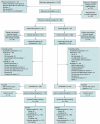Enhancing communication between oncologists and patients with a computer-based training program: a randomized trial
- PMID: 22041948
- PMCID: PMC3368370
- DOI: 10.7326/0003-4819-155-9-201111010-00007
Enhancing communication between oncologists and patients with a computer-based training program: a randomized trial
Abstract
Background: Quality cancer care requires addressing patients' emotions, which oncologists infrequently do. Multiday courses can teach oncologists skills to handle emotion; however, such workshops are long and costly.
Objective: To test whether a brief, computerized intervention improves oncologist responses to patient expressions of negative emotion.
Design: Randomized, controlled, parallel-group trial stratified by site, sex, and oncologic specialty. Oncologists were randomly assigned to receive a communication lecture or the lecture plus a tailored CD-ROM. (ClinicalTrials.gov registration number: NCT00276627)
Setting: Oncology clinics at a comprehensive cancer center and Veterans Affairs Medical Center in Durham, North Carolina, and a comprehensive cancer center in Pittsburgh, Pennsylvania.
Participants: 48 medical, gynecologic, and radiation oncologists and 264 patients with advanced cancer.
Intervention: Oncologists were randomly assigned in a 1:1 ratio to receive an interactive CD-ROM about responding to patients' negative emotions. The CD-ROM included tailored feedback on the oncologists' own recorded conversations.
Measurements: Postintervention audio recordings were used to identify the number of empathic statements and responses to patients' expressions of negative emotion. Surveys evaluated patients' trust in their oncologists and perceptions of their oncologists' communication skills.
Results: Oncologists in the intervention group used more empathic statements (relative risk, 1.9 [95% CI, 1.1 to 3.3]; P = 0.024) and were more likely to respond to negative emotions empathically (odds ratio, 2.1 [CI, 1.1 to 4.2]; P = 0.028) than control oncologists. Patients of intervention oncologists reported greater trust in their oncologists than did patients of control oncologists (estimated mean difference, 0.1 [CI, 0.0 to 0.2]; P = 0.036). There was no significant difference in perceptions of communication skills.
Limitations: Long-term effects were not examined. The findings may not be generalizable outside of academic medical centers.
Conclusion: A brief computerized intervention improves how oncologists respond to patients' expressions of negative emotions.
Primary funding source: National Cancer Institute.
References
-
- Weiss SC, Emanuel LL, Fairclough DL, Emanuel EJ. Understanding the experience of pain in terminally ill patients. Lancet. 2001;357:1311–5. PMID: 11343734. - PubMed
-
- Wilson KG, Chochinov HM, McPherson CJ, LeMay K, Allard P, Chary S, et al. Suffering with advanced cancer. J Clin Oncol. 2007;25:1691–7. PMID: 17470861. - PubMed
-
- Zabora J, BrintzenhofeSzoc K, Curbow B, Hooker C, Piantadosi S. The prevalence of psychological distress by cancer site. Psychooncology. 2001;10:19–28. PMID: 11180574. - PubMed
-
- Spiegel D. Cancer and depression. Br J Psychiatry Suppl. 1996:109–16. PMID: 8864156. - PubMed
-
- Stark D, Kiely M, Smith A, Velikova G, House A, Selby P. Anxiety disorders in cancer patients: their nature, associations, and relation to quality of life. J Clin Oncol. 2002;20:3137–48. PMID: 12118028. - PubMed
Publication types
MeSH terms
Associated data
Grants and funding
LinkOut - more resources
Full Text Sources
Other Literature Sources
Medical

